About
Effective Teaching
The
most important factor in improved student learning is with an effective
teacher. Written ten times a year, Harry and Rosemary Wong
feature effective teachers and administrators and what they do to
enhance student learning. The columns provide specific strategies
and activities that you can download and use. An archive of
past articles can be found at the end of every column.
These
strategies and activities are all based on the teachings and works
of Harry and Rosemary Wong and they are happy to share with the
profession the work of effective teachers. If you have an
effective strategy or technique that works, please share this by
sending it to hwong@harrywong.com.
The Wongs will consider it for sharing in future Effective Teaching
columns.
About Harry and Rosemary
Wong...
Harry
and Rosemary Wong are teachers. Harry is a native of San Francisco
and taught middle school and high school science. Rosemary
is a native of New Orleans and taught K-8, including working as
the school media coordinator and student activity director.
Harry
Wong has been awarded the Outstanding Secondary Teacher Award, the
Science Teacher Achievement Recognition Award, the Outstanding Biology
Teacher Award, and the Valley Forge Teacher's Medal. He was
recently selected as one of the most admired people in the world
of education by readers of Instructor magazine. Rosemary
was chosen as one of California's first mentor teachers and has
been awarded the Silicon Valley Distinguished Woman of the Year
Award.
Harry
Wong is the most sought after speaker in education today.
He has been called "Mr. Practicality" for his common sense,
user-friendly, no-cost approach to managing a classroom for high-level
student success.
Nearly
a million teachers worldwide have heard his message. Because
he is fully booked for two years, he has agreed to and has invited
his wife to join him in doing a monthly column for teachers.net
so that more people can hear their message.
About Their Work...
Harry and Rosemary
Wong are committed to bringing quality and dignity to the materials
they produce. For this, they have formed their own publishing company,
of which Rosemary is the CEO. They have dedicated their lives
to leaving a legacy in education and making a difference in the
lives of teachers and students.
Their latest contribution
to helping teachers succeed is an eLearning course, Classroom
Management with Harry and Rosemary Wong. The
course can be taken in private at the learner's convenience.
The outcome of the course is a 2 inch binder with a personalized
Classroom Management Action Plan.
This Action Plan is
similar to the organized and structured plan used by all successful
teachers. Details for the classroom management course can
be seen at www.ClassroomManagement.com.
The Wongs have written
The First Days of School, the best-selling
book ever in education. Over 3 million copies have been sold.
The third edition
of The First Days of School includes an
added bonus, an Enhanced CD featuring Harry Wong. The Enhanced CD,
Never Cease to Learn, is dedicated to
those teachers who know that the more they learn, the more effective
they become.
The Wongs have also
produced the DVD series, The Effective Teacher,
winner of the Telly Award for the best educational video of the
past twenty years and awarded the 1st place Gold Award in the International
Film and Video Festival.
They have released
a new set of CDs with Harry Wong LIVE, called How
to Improve Student Achievement, recorded at one of
his many presentations. He is the most sought after speaker
in education and his presentations are legendary.
When the book, video
series, CD, and eLearning course are used together, they form the
most effective staff training tool for developing effective teachers.
Staff developers and administrators who would like to know how to
implement the aforementioned book, video series, and CD are encouraged
to consult the book, New Teacher Induction: How to Train,
Support, and Retain New Teachers. Information about
these products can be found by visiting the publisher's website
at www.EffectiveTeaching.com
or www.HarryWong.com.
Best Sellers
 The First Days of School with Enhanced CD, Never
Cease to Learn
The First Days of School with Enhanced CD, Never
Cease to Learn
by Harry & Rosemary Wong
$23.96 from Amazon.com
More
information
 The Effective Teacher (Video Set)
The Effective Teacher (Video Set)
Presented by Harry Wong
8 DVDs, with Facilitator's
Handbook in PDF, book The First Days of
School, and storage case, $695.00 from EffectiveTeaching.com
(volume discounts available)
More
information
Classroom
Management with Harry and Rosemary Wong
eLearning course
for individual use, CEUs available Preview the course and order
at www.ClassroomManagement.com
$124.95 (Group discounts available.)

How to Improve Student Achievement
Hear Harry Wong Live! in this 2 CD set
$31.95
More
information
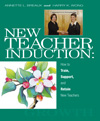
New Teacher Induction: How to Train, Support, and Retain
New Teachers
by Annette L. Breaux, Harry K. Wong
$24.05 from Amazon.com
More
information
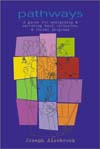
Pathways: A Guide for Energizing & Enriching Band, Orchestra, &
Choral Programs
by Joseph Alsobrook
$12.57 from Amazon.com
More
information

Results : The Key to Continuous School Improvement
by Mike Schmoker
$20.95 from Amazon.com
More
information

Improving Schools from Within : Teachers, Parents, and Principals
Can Make the Difference
by Roland Sawyer Barth
$13.30 from Amazon.com
More
information
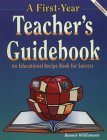
A First-Year Teacher's Guidebook, 2nd Ed.
by Bonnie Williamson, Marilyn Pribus (Editor), Kathy Hoff, Sandy Thornton
(Illustrator)
$17.95 from Amazon.com
More
information
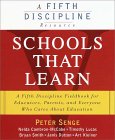
Schools That Learn: A Fifth Discipline Fieldbook for Educators,
Parents, and Everyone Who Cares About Education
by Peter M. Senge (Editor), Nelda H. Cambron McCabe, Timothy Lucas,
Art Kleiner, Janis Dutton, Bryan Smith
$24.50 from Amazon.com
More
information

The Courage to Teach : Exploring the Inner Landscape of a Teacher's
Life
by Parker J. Palmer
$16.76 from Amazon.com
More
information
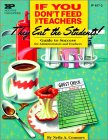
If You Don't Feed the Teachers They Eat the Students : Guide to
Success for Administrators and Teachers
by Neila A. Connors
$13.96 from Amazon.com
More
information
|
| 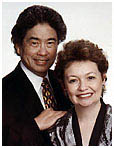 Effective
Teaching...
Effective
Teaching...
by Harry and Rosemary
Wong
March
2003
A First Day
of School Script
(continued from page 1)
Script for the First Day of School
John Schmidt
Homewood-Flossmoor High School
Before Class
- Have a clearly marked sign on the door and on the front chalkboard that indicates the name of the class, the teacher, the hour, and the room number.
- Place a copy of the Student Information Survey on every student desk to be completed as bellwork.
- Setup individual trays for every handout the students will need to pickup. Place a sign that reads "Please Take One" near the trays.
- Setup a copy of the textbook, a sample binder, and a sample notebook on the chalkboard sill.
- Use the overhead projector to display the seating chart.
Greet at the Door
- Welcome each student with a handshake and hello.
- Look directly at each student, not the busy hallway or the growing line of people at the door, when they introduce themselves.
- Make sure every student is in the right place at the right time.
- Tell each student the following:
- They can find their seat by referencing the seating chart on the projection screen.
- They should grab the 3 handouts on the table at the front of the room.
- They have a bellwork activity waiting for them at their desks.
Welcome and Introduction
- Welcome everyone to the first day of school and ask the students to take a few more minutes to finish the bellwork.
- Take attendance by referencing the seating chart.
- Welcome everyone again and introduce yourself.
- Provide a few tidbits of appropriate personal information (educational background, family, etc.).
- Explain your personal educational philosophy.
- Stress that you are very excited to be back at school and that you look forward to a successful year ahead.
Syllabus Explanation (Handout 1)
- Ask the students to reference the Course Syllabus handout.
- Explain the basic course information.
- Provide instructor contact information.
- Discuss the course objectives.
- Identify the required class materials and reference the items setup on the chalkboard sill as a visual reminder of what each student will need.
- Explain the grading scale.
- Discuss specific academic requirements.
Class Policies Explanation (Handout 2)
- Ask the students to reference the Class Policies handout.
- Discuss your overall discipline philosophy.
- Stress that a student chooses to break a rule.
- Explain the short list of simple class rules and ask the students to explain why they are in place.
- Stress that the class rules will be consistently enforced.
- Explain the detention policy.
- Explain the tardy and late arrival policy.
- Discuss the importance of academic honesty.
- Discuss the attendance requirements.
- Explain the late work policy.
- Explain the make-up test policy.
- Ask each student to sign the back of the Student Information Survey in the space that indicates that they understand and agree to all of the class policies.
Class Procedures (Handout 3)
- Ask the students to reference the Class Procedures handout.
- Explain the purpose of class procedures by using an appropriate analogy.
- Promise the students an organized and efficient classroom.
- Explain the importance of following procedures.
- Explain the difference between procedures and rules.
- Explain and rehearse the following procedures: entering the room, bellwork, picking up materials, coming to attention, arriving late, and leaving the classroom.
- Explain that other procedures will be explained and rehearsed as they become necessary (getting absent work, make-up tests, using the bathroom, getting a detention, getting extra handouts, handing in homework).
Dismissing the Class
- With a few minutes remaining, reiterate your excitement for the upcoming year.
- Tell the students that it was nice to meet all of them.
- Rehearse the procedure for leaving the classroom and require the students to wait for teacher dismissal before leaving the classroom.
- Collect student information sheets as the students leave the class.
Class Policies
Mr. Schmidt
A. Note from the Instructor
I will lead a respectful and disciplined classroom. To achieve this I have established a few simple policies. As a student, it is your responsibility to comply with these policies. If you decide not to comply, there will be logical consequences. By enforcing these policies, I promise to you fairness and order in our classroom.
B. Class Rules
Watch Your Mouth- Students will exhibit courtesy and respect toward all other students at all times. Hateful comments concerning race, gender, sexuality, political views, appearance, or of any other type will not be tolerated; this applies to serious as well as "joking" comments.
Keep Your Hands to Yourself- Physical contact of any kind is not permitted. Violation of this simple rule will be punished by the most severe consequences possible.
Stay in Your Seat- Do not walk around during class unless directed to do so. Have everything you need ready before class begins.
Leave the Food at Home- Students may not eat or drink in the classroom. This includes gum and candy. Closable containers of water are permitted.
I Need to See Your Eyes- Students may not sleep in class. To prevent this, students' eyes must be open and visible to the instructor at all times.
Nothing Goes Airborne- Nothing will go airborne in class at any time. This includes pens, paper, and other students.
Do Not Say "Shut Up"- This phrase has no place in school. Do not use it.
C. If YOU CHOOSE to Break a Rule:
Punishments will always fit the crime. Of course there are behaviors that will warrant a Dean's Referral immediately. Examples of this include gross insubordination or violent behavior. Behaviors that are less severe, but in violation of the basic rules of the class will be dealt with in the manner described below. This format is in no way all inclusive and is subject to change:
1st Incident -- Warning and name on board
2nd Incident -- 30-minute detention and check next to name
3rd Incident- 60-minute detention, phone call home, and second check
4th Incident -- Dean's referral and phone call home
Warnings carry over for the entire week. Name and checks will be erased on Fridays. However, continued violations will be noted and dealt with appropriately.
D. Detentions
All detentions will be served on Friday. Detentions can be served before or after school. One day notice will always be given. Students receiving a detention on a Friday may serve it the following Friday if necessary.
E. Tardies and Late Arrivals
A Student who is not in the classroom when the bell sounds, is considered either late or tardy. A student is tardy if he is without a pass after the bell. A student is late if he arrives with a pass after the bell. Tardy and Late students need to sign-in at the clipboard by the door, and are not to disrupt the class. Late students need to pin their pass to the wall above the clipboard. There is no penalty for arriving late with a pass. The tardy penalty is explained below:
Definition: A student is tardy if he is not inside the classroom when the bell stops ringing and does not have a pass.
F. Academic Honesty
It is expected that students will use genuine, sincere, and fair means for the accomplishment of the tests, tasks, or projects from which evaluations of progress shall be determined. Students found plagiarizing, copying or cheating in any way will receive automatic zeros and have phone calls made to their parents. In addition, a write-up of the incident will be given to the student's counselor. Flagrant or repeated offenses will result in a failing grade for the quarter or semester depending on the nature of the incident.
G. Attendance
If a student has an excused absence from class he or she is responsible for the assignments/ homework that missed. The student has as many days as he or she was absent to make up the assignments. It is up to the student to inquire about missed work and tests. Zeros will be given if a student fails to make up work within an acceptable time frame. Unexcused absences void all make-up privileges.
H. Late Work
Homework assignments may not be turned in late. Papers and projects may be turned in late with a penalty of one letter grade for each day late.
I. Make-Up Tests
If a student has an excused absence for a test day, he may make up the test in the morning or afternoon on Fridays. Arranging a make-up requires signing in with the instructor. A missed make-up appointment without notice will result in a zero. Quizzes are not to be made-up. Instead, the previous night's homework will be handed in and graded in place of the quiz.
Click for next page
 For a printable version of this article click
here.
For a printable version of this article click
here.
Harry & Rosemary Wong products: http://www.harrywong.com/product/
Email Harry Wong: harrywong@teachers.net
Gazette Articles by Harry & Rosemary Wong:
If you spot a link that appears to be out-of-date, please alert us at webmaster@teachers.net!
- A Grateful Goodbye After 15 Years (Jun 2015)
- Love, Marriage, and Babies, Oh My! (May 2015)
- Retention Rate Is 100 Percent (Apr 2015)
- Teacher Effectiveness and Human Capital (Mar 2015)
- Training Teachers to Be Effective (Feb 2015)
- Making Deals Is Ineffective (Dec 2014 / Jan 2015)
- Retrieving and Carrying Electronic Devices (Nov 2014)
- Sharing to Succeed (Oct 2014)
- How a University Prepares Its Students (Sep 2014)
- Effective Teaching (Aug 2014)
- Your Future Is in Your Hands (June/July 2014)
- The Classroom Management Book (May 2014)
- When Students Succeed; Teachers Succeed (April 2014)
- Teaching New Teachers How to Succeed (March 2014)
- Execute and Praise (February 2014)
- Shaping a Solid Foundation (Dec 2013 / Jan 2014)
- The Most Misunderstood Word (November 2013)
- How to Start Class Every Day (October 2013)
- Prevention: The Key to Solving Discipline Problems (September 2013)
- Planning, Planning, Planning (August 2013)
- Are You THE One? (June / July 2013)
- Practical Examples That Work (May 2013)
- A Disability Is Not a Handicap (Apr 2013)
- Totally Inexcusable (Mar 2013)
- Be Proud of Public Education (Feb 2013)
- Structure Will Motivate Students (Dec 2012 / Jan2013)
- Orchestrating the Classroom (Nov 2012)
- The Lasting Impact of Instructional Coaching (Oct 2012)
- Learning, Laughing, and Leaving a Legacy (Sep 2012)
- Twenty-two, First Year, and Legit (Aug 2012)
- A Master Teacher of Teachers (June/July 2012)
- Where Going to School Means Success (May 2012)
- A Nationally Celebrated High School (Apr 2012)
- The Highest Rated School in New York City, Part 2 (Mar 2012)
- The Highest Rated School in New York City, Part 1 (Feb 2012)
- The Importance of Culture (Dec 2011 / Jan 2012)
- You Can Teach Classroom Management (Nov 2011)
- Seamless, Transparent, and Consistent (Oct 2011)
- Coaching Teachers to Be Effective Instructors (Sep 2011)
- How a Principal Creates a Culture of Consistency (Aug 2011)
- Graduation Begins in Your Classroom (June/July 2011)
- The Inspiration of a Mother (May 2011)
- How to Be an Effective Leader (Apr 2011)
- Learning Objectives: The Heart of Every Lesson (Mar 2011)
- Even Shakespeare Had Structure (Feb 2011)
- Effectiveness Defined: It's Not a Mystery (Dec 2010 / Jan 2011)
- Surviving Without a Principal (Nov 2010)
- Achieving Greatness: Locke Elementary School, Part 2 (Oct 2010)
- Teaching Greatness: Locke Elementary School, Part 1 (Sep 2010)
- Effective from the Start (Aug 2010)
- Ten Year Summary of Articles, 2000 to 2010 (June/July 2010)
- The Success of a Culture of Consistency (May 2010)
- Training Teachers to Be Effective (Apr 2010)
- Learning to Teach, Teaching to Learn (Mar 2010)
- Turning Teaching Dreams into Reality (Feb 2010)
- Dreams and Wishes Can Come True (Dec 2009 / Jan 2010)
- Success in a State Controlled School (Nov 2009)
- Inner City Is Not An Excuse (Oct 2009)
- Exceeding All Expectations (Sep 2009)
- Teachers Are the Difference (Aug 2009)
- Nine Year Summary of Articles, 2000 to 2009 (Jun/Jul 2009)
- Teachers Are the Greatest Assets (May 2009)
- The Tools for Success (Apr 2009)
- Assessing for Student Learning (Mar 2009)
- To Be an Effective Teacher Simply Copy and Paste (Feb 2009)
- The Sounds of Students Learning and Performing (Dec 2008)
- A School That Achieves Greatness (Nov 2008)
- Boaz City Schools: Professional Learning Teams (Oct 2008)
- It Was Something Close to a Miracle (Sep 2008)
- A Computer Teacher Shows the Way (Aug 2008)
- Eight Year Summary of Articles, 2000 to 2008 (Jun/Jul 2008)
- An Amazing Kindergarten Teacher (May 2008)
- Schools That Beat the Academic Odds (Apr 2008)
- Academic Coaching Produces More Effective Teachers (Mar 2008)
- Coaches Are More Effective than Mentors (Feb 2008)
- Wrapping the Year with Rap! (Dec 2007/Jan 2008)
- The Floating Teacher (Nov 2007)
- Taking the Bite Out of Assessment—Using Scoring Guides (Oct 2007)
- Ten Timely Tools for Success on the First Days of School (Sep 2007)
- First Day of School Script - in Spanish, Too! (Aug 2007)
- Seven Year Summary of Articles, 2000 to 2007 (Jun 2007)
- Effective Teachers End the Year Successfully (May 2007)
- Training Gen Y Teachers for Maximum Effectiveness (Apr 2007)
- Classroom Management Applies to All Teachers (Mar 2007)
- Students Want a Sense of Direction (Feb 2007)
- Rubrics in Two College Classes (Dec 2006/Jan 2007)
- How to Write a Rubric (Nov 2006)
- Assessing Student Progress with a Rubric (Oct 2006)
- A 92 Percent Homework Turn-in Rate (Sep 2006)
- Effective Teachers Are Proactive (Aug 2006)
- Five Year Summary of Articles (Jun 2006)
- Hitting the Bulls Eye as a Beginning Teacher (May 2006)
- They're Eager to Do the Assignments (Apr 2006)
- The Success of Special Ed Teachers (Mar 2006)
- What Teachers Have Accomplished (Feb 2006)
- Fifty Years Ago, The Legacy (Dec 2005/Jan 2006)
- The Emergency Teacher (Nov 2005)
- Classroom Management Is Not Discipline (Oct 2005)
- A Successful First Day Is No Secret (Sep 2005)
- The Most Important Factor (Aug 2005)
- Four Year Summary of Articles (Jul 2005)
- Improving Student Achievement Is Very Simple (Part 2) (Jun 2005)
- Improving Student Achievement Is Very Simple (Part 1) (May 2005)
- Never Cease to Learn (Apr 2005)
- His Classroom Is a Real Life Office (Mar 2005)
- The Power of Procedures (Feb 2005)
- The First Ten Days of School (Jan 2005)
- PowerPoint Procedures (Nov/Dec 2004)
- The Saints of Education (Oct 2004)
- How Procedures Saved a Teacher's Life (Sep 2004)
- How to Help Students with Their Assignments (Aug 2004)
- Three Year Summary of Articles (Jun/Jul 2004)
- His Students are All Certified (May 2004)
- What to Do When They Complain (Apr 2004)
- A Well-Oiled Learning Machine (Mar 2004)
- The Effective Teacher Adapts (Feb 2004)
- How to Start a Lesson Plan (Aug 2003)
- Applying for a Teaching Job in a Tight Market - Part 2 (Jun/Jul 2003)
- Applying for a Teaching Job in a Tight Market (May 2003)
- The Effective Substitute Teacher (Apr 2003)
- A First Day of School Script (Mar 2003)
- How to Retain New Teachers (Feb 2003)
- No Problem With Hurricane Lili (Dec 2002)
- A Class Size of 500 (Nov 2002)
- Effective Practices Apply to All Teachers (Oct 2002)
- Dispensing Materials in Fifteen Seconds (Sept 2002)
- How To Start School Successfully (Aug 2002)
- Teaching Procedures Is Teaching Expectations (June - July 2002)
- $50,000 to Replace Each Teacher (May 2002)
- Even Superintendents Do It (Apr 2002)
- Impossible, No Job Openings? (Mar 2002)
- A Stress Free Teacher (Feb 2002)
- A Most Effective School (Jan 2002)
- Van Gogh in Nine Hours (Dec 2001)
- The Effective Teacher Thinks (Nov 2001)
- How a Good University Can Help You (Sep 2001)
- How to Motivate Your Students (May 2001)
- How to Recognize Where You Want to Be (Apr 2001)
- What Successful New Teachers Are Taught (Mar 2001)
- A Journey of the Heart (Feb 2001)
- The Miracle of Teachers (Jan 2001)
- It's Not the Students. It's the Teacher. (Dec 2000)
- The First Five Minutes Are Critical (Nov 2000)
- How to Start a Class Effectively (Oct 2000)
- The Problem Is Not Discipline (Sep 2000)
- There Is Only One First Day of School (Aug 2000)
- Applying for Your First Job (Jul 2000)
- Your First Day (Jun 2000)
Browse through the latest posts from the Classroom Management
Chatboard...
|
|













 Effective
Teaching...
Effective
Teaching...